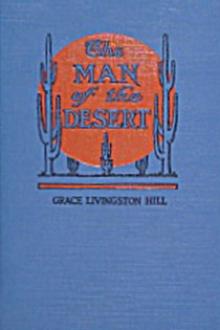The Man of the Desert, Grace Livingston Hill [the reader ebook .txt] 📗

- Author: Grace Livingston Hill
- Performer: -
Book online «The Man of the Desert, Grace Livingston Hill [the reader ebook .txt] 📗». Author Grace Livingston Hill
"Wal," said the landlord chinking some loose coins in his capacious pockets, "I reckon Mis' Brownleigh'll miss yeh 'bout as much as enny of us. She lots on your comin' over to read to her. I've heerd her say as how Amelia Ellen is a good nurse, but she never was much on the readin', an' Amelia Ellen knows it too. Mis' Brownleigh she'll be powerful lonesome fer yeh when yeh go. It's not so lively fur her tied to her bed er her chair, even ef John does write to her reg'lur twicet a week."
And now Hazel noticed that on the covered veranda in front of the wing of the house across the way there sat an old lady on a reclining wheeled chair, and that another woman in a plain blue gown hovered near waiting upon her. A luxuriant woodbine partly hid the chair, and the distance was too great to see the face of the woman, but Hazel grew weak with wonder and pleasure. She sat quite still trying to gather her forces while the summer boarder expressed earnest regret at having to leave her chosen summer abiding place so much earlier than usual. At last her friends began to rally Hazel on her silence. She turned away annoyed, and answered them crossly, following the landlord into the house and questioning him eagerly. She had suddenly arrived at the conclusion that she must see Mrs. Brownleigh and know if she looked like her son, and if she was the kind of mother one would expect such a son to have. She felt that in the sight might lie her emancipation from the bewitchment that had bound her in its toils since her Western trip. She also secretly hoped it might justify her dearest dreams of what his mother was like.
"Do you suppose that lady across the street would mind if I went over to look at her beautiful flowers?" she burst in upon the astonished landlord as he tipped his chair back with his feet on another and prepared to browse over yesterday's paper for the third time that day.
He brought his chair down on its four legs with a thump and drew his hat further over his forehead.
"Not a bit, not a bit, young lady. She's proud to show off her flowers. They're one of the sights of Granville. Mis' Brownleigh loves to have comp'ny. Jest go right over an' tell her I sent you. She'll tell you all about 'em, an' like ez not she'll give you a bokay to take 'long. She's real generous with 'em."
He tottered out to the door after her on his stiff rheumatic legs, and suggested that the other young ladies might like to go along, but they one and all declined, to Hazel's intense relief, and called their ridicule after her as she picked her way across the dusty road and opened the white gate into the peaceful scene beyond.
When she drew close to the side piazza she saw one of the most beautiful faces she had ever looked upon. The features were delicate and exquisitely modelled, aged by years and much suffering, yet lovely with a peace that had permitted no fretting. An abundance of waving silken hair white as driven snow was piled high upon her head against the snowy pillow, and soft brown eyes made the girl's heart throb quickly with their likeness to those other eyes that had once looked into hers.
She was dressed in a simple little muslin gown of white and gray with white cloud-like finish at throat and wrists, and across the helpless limbs was flung a light afghan of pink and gray wool. She made a sweet picture as she lay and watched her approaching guest with a smile of interest and welcome.
"The landlord said you would not mind if I came over to see your flowers," Hazel said with a shy, half-frightened catch in her voice. Now that she was here she was almost sorry she had come. It might not be his mother at all, and what could she say anyway? Yet her first glimpse told her that this was a mother to be proud of. "The most beautiful mother in the world" he had called her, and surely this woman could be none other than the one who had mothered such a son. Her highest ideals of motherhood seemed realized as she gazed upon the peaceful face of the invalid.
And then the voice! For the woman was speaking now, holding out a lily-white hand to her and bidding her be seated in the Chinese willow chair that stood close by the wheeled one; a great green silk cushion at the back, and a large palm leaf fan on the table beside it.
"I am so pleased that you came over," Mrs. Brownleigh was saying. "I have been wondering if some one wouldn't come to me. I keep my flowers partly to attract my friends, for I can stand a great deal of company since I'm all alone. You came in the big motor car that broke down, didn't you? I've been watching the pretty girls over there, in their gay ribbons and veils. They look like human flowers. Rest here and tell me where you have come from and where you are going, while Amelia Ellen picks you some flowers to take along. Afterwards you shall go among them and see if there are any you like that she has missed. Amelia Ellen! Get your basket and scissors and pick a great many flowers for this young lady. It is getting late and they have not much longer to blossom. There are three white buds on the rose-bush. Pick them all. I think they fit your face, my dear. Now take off your hat and let me see your pretty hair without its covering. I want to get your picture fixed in my heart so I can look at you after you are gone."
And so quite simply they fell into easy talk about each other, the day, the village, and the flowers.
"You see the little white church down the street? My husband was its pastor for twenty years. I came to this house a bride, and our boy was born here. Afterwards, when his father was taken away, I stayed right here with the people who loved him. The boy was in college then, getting ready to take up his father's work. I've stayed here ever since. I love the people and they love me, and I couldn't very well be moved, you know. My boy is out in Arizona, a home missionary!" She said it as Abraham Lincoln's mother might have said: "My boy is president of the United States!" Her face wore a kind of glory that bore a startling resemblance to the man of the desert. Hazel marvelled greatly, and understood what had made the son so great.
"I don't see how he could go and leave you alone!" she broke forth almost bitterly. "I should think his duty was here with his mother!"
"Yes, I know," the mother smiled; "they do say that, some of them, but it's because they don't understand. You see we gave John to God when he was born, and it was our hope from the first that he would choose to be a minister and a missionary. Of course John thought at first after his father went away that he could not leave me, but I made him see that I would be happier so. He wanted me to go with him, but I knew I should only be a hindrance to the work, and it came to me that my part in the work was to stay at home and let him go. It was all I had left to do after I became an invalid. And I'm very comfortable. Amelia Ellen takes care of me like a baby, and there are plenty of friends. My boy writes me beautiful letters twice a week, and we have such nice talks about the work. He's very like his father, and growing more so every day. Perhaps," she faltered and fumbled under the pink and silver lap robe, "perhaps you'd like to read a bit of one of his letters. I have it here. It came yesterday and I've only read it twice. I don't let myself read them too often because they have to last three days apiece at least. Perhaps you'd read it aloud to me. I like to hear John's words aloud sometimes and Amelia Ellen has never spent much time reading. She is peculiar in her pronunciation. Do you mind reading it to me?"
She held a letter forth, written in a strong free hand, the same that had signed the name John Chadwick Brownleigh in the little book. Hazel's heart throbbed eagerly and her hand trembled as she reached it shyly towards the letter. What a miracle was this! that his very letter was being put into her hand, her whom he loved—to read! Was it possible? Could there be a mistake? No, surely not. There could not be two John Brownleighs, both missionaries to Arizona.
"Dear little Mother o' Mine:" it began, and plunged at once into the breezy life of the Western country. He had been to a cattle round-up the week before and he described it minutely in terse and vivid language, with many a flash of wit, or graver touch of wisdom, and here and there a boyish expression that showed him young at heart, and devoted to his mother. He told of a visit he had paid to the Hopi Indians, their strange villages, each like a gigantic house with many rooms, called a pueblo, built on the edges of lofty crags or mesas and looking like huge castles five or six hundred feet above the desert floor. He told of Walpi, a village out on the end of a great promontory, its only access a narrow neck of land less than a rod wide, with one little path worn more than a foot deep in the solid rock by the feet of ten generations passing over it, where now live about two hundred and thirty people in one building. There were seven of these villages built on three mesas that reach out from the northern desert like three great fingers, Oraibi, the largest, having over a thousand people. He explained that Spanish explorers found these Hopis in 1540, long before the pilgrims landed at Plymouth Rock, and called the country Tusayan. Then he went on to describe a remarkable meeting that had been held in which the Indians had manifested deep interest in spiritual things, and had asked many curious questions about life, death and the hereafter.
"You see, dear," said the mother, her eyes shining eagerly, "you see how much they need him, and I'm glad I can give him. It makes me have a part in the work."
Hazel turned back to the letter and went on reading to hide the tears that were gathering in her own eyes as she looked upon the exalted face of the mother.
There was a detailed account of a conference of missionaries, to attend which the rider had ridden ninety miles on horseback; and at the close there was an exquisite description of the spot where they had camped the last night of their ride. She knew it from the first word almost, and her heart beat so wildly she could hardly keep her voice steady to read:
"I stopped over night on the way home





Comments (0)